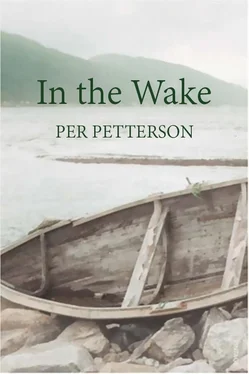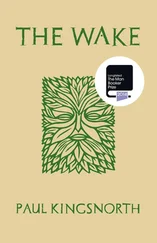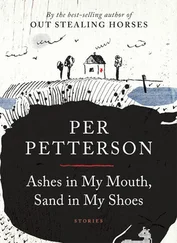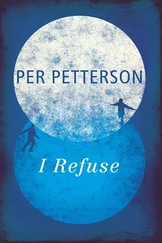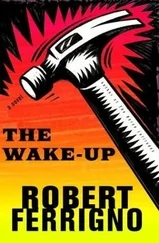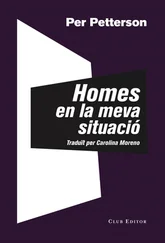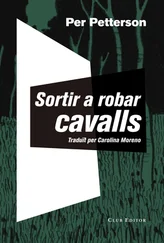“Hello,” he said wearily.
“Switch on the TV,” I said. He switched his TV on, keeping hold of the telephone. I heard the voice from the studio in the room he was in. I heard him breathe, but he said nothing.
“I should have been on that boat,” I said, “but I forgot, you know, I just forgot about it, and then it was too late. If I had not forgotten it, if I had just gone with them, then nothing would have happened.”
“Oh, God,” he said, his voice completely flat, “please, be quiet, please.”
I wake up once, and it is night. I must have gone on talking in my sleep, my lips are still moving and they feel swollen, and there is an echo of words in a hollow in my head. I raise my hand and run it over my face. It is soaking wet again. There is a pain in my side, and something in my throat burns and irritates. I cautiously clear it. Someone is breathing in the darkness beside me as if nothing has happened, as if life has stood still, and for a moment I do not remember who it is and panic and switch on the light over the bed. She smiles in her sleep and puts her arm over her eyes and turns, not away from me but towards me, and the relief I feel is overwhelming. I turn off the light and go back to sleep, and dream that my brother has made himself a fortune out of insurance shares and bought himself a sailing boat.
“We, the rich, have it made,” he says, “I wouldn’t have been poor for all the money in the world.”
We are on board that boat, just him and me, and there is a fresh breeze out past Færder lighthouse in the wake of bigger boats, and we lie so low in the water that you only have to lean over the gunwale to get a handful of foaming salt water. And I do that, I lean over the gunwale and scoop up the water in my hands and rinse my face and get some in my mouth and swallow and think: it has a new taste, it was not like this before. Then I tease my brother about his new sailing shoes, which only upper-class people use, in my opinion. I would not touch a pair like that even if someone paid me to.
“Is tennis the next thing then, or what?” I ask and laugh through clenched teeth — “or golf maybe, or buy slalom skis and mix with the in-crowd?”
“But it was Dad who made them,” he says through tears, “he wanted me to have them.”
“That is not true,” I say.
*
That dream plunges me into such despair that I wake up. I lie stiffly, holding my breath, and there is not a sound in the room. I am alone. I slide my arm over the pillow, it is still warm, but she has not left a note. I do not want to be alone. I jump out of bed and run into the hall. In the mirror I see a face, and I stop and without thinking grab the first thing I see, a metal box standing on the chest, and hurl it at the mirror. The glass breaks with an incredibly loud noise, it disintegrates into glittering fragments raining silver on the floor, and I stand there watching them spread all over the hall like the aftermath of an explosion in a film on TV. One of the fragments slices into my arm and blood trickles out, not much but enough to show red against the white skin. I raise my arm and lick the blood up, and then I hop slalom between the glass splinters into the living room. The boy has gone from the sofa, only the impression in the cushions reveals he was there. I run over to the big window gasping for breath, hand to my side, and I stop close to it with my nose on the glass, and stare across to the next block. She is standing at her window in her dressing gown. I am as naked as I was the previous time, and I see her turning and looking back at me, and we just stand there and then she lets her dressing gown drop without thinking of those who may be awake, as we are awake, and can see her from this side. Her skin shines dimly and is whiter than anything else I can see, and she lifts both hands and lays their palms against the pane, and then I do the same, lift my hands and lay the palms against the pane, and it’s as if it was just that one window, a few millimetres of glass between her and me on a night when the rain has stopped and the moon hangs transparent and clear above the block right in front of me, and I stand naked in my own living room with hands and nose on the window, and I hear my breath wheezing and my heart beating, but otherwise all is silence.
I do not know how long we stand like this, perhaps a minute, perhaps five minutes, but then it is over. She raises one hand and covers her face, and with the other makes a movement meant only for me, that most people would call indecent indeed, and I know she is laughing, and she waves and I wave back and then she is gone.
It will soon be morning, but I go back to bed and sleep until the day is far advanced. I have no dreams I can remember when I wake up, but I am sweating under the duvet and have a headache. There is sunshine in the room. The air is thick, and I get up and open the window and look straight out to the path and the space in front of the block where the usual ladies walk past with the usual kids in rather lighter clothes today on their way to the playground or on their way back, and it is late March and suddenly warm. The men I see are refugees from very different parts of the world, and they do not play with their children as I might have done just a few years ago in front of this very block, no, they stand quite still and rigid by the sandpit with their hands in their pockets or arms crossed on their chest, with a stiff smile round their mouth and a dreaming expression in their eyes looking right through the blocks and far, far away.
A couple of Norwegian men who are on social security walk past very slowly with a slight but pronounced limp. It is wasted on me, I have no reason to doubt their disability. It is mine I doubt. When one of the neighbours had seen me staying at home for the third month on end, he came up to me one day at the Co-op and asked timidly:
“So, are you on benefit now?”
“No,” I said, “I am on a scholarship,” and he gave a sympathetic nod, understanding it was something to do with my nerves.
“Well, it’s not easy,” he said.
“No,” I said, “it’s not.”
He stayed at home himself, and told me he did not dare go shopping before the middle of the day. I took his point. That was a couple of years ago. After that we have greeted each other like two men with a fate in common. Now I see him walking along the path on his way to the Co-op, so it must be late.
I go from the open bedroom window through the hall close to the wall as carefully as I can and into the living room where the desk is tidy and dusted with the little Mac switched off and quiet. Beside it lies a not particularly thick pile of typescript. I put on my spectacles and riffle lightly through the pile, and it seems as if I had not seen it before, page after page with unreadable, indifferent writing, from a world no longer mine. If it ever was. I pick up the pile from the table and walk into the kitchen and throw everything into the plastic bag beneath the sink. Two years straight into the bin. I feel neither one thing nor another. I take the plastic bag out and tie the drawstring and go back to the living room, switch the Mac on, wait, click on “hard disk” and get the menu, then use the mouse to log on to the file named “new book” and drag it round the whole screen to the waste bin in the bottom right-hand corner. It always makes me think of the first Fleetwood Mac LP I bought in 1968 when Peter Green was young and his brain not yet bombed. I’ve got a hellhound on my trail , it sings inside of me, the bin bulges and widens in the middle, and I find the icon for “empty waste bin”. “Click,” I say aloud and push my index finger down, and the waste bin gets slim again. Then I find the file with the few sentences I wrote some days ago, which run: I see the shape of the wind on the water , and switch on the printer to make a copy. I click off and close down, pick up the one sheet and put it in the top drawer. Brush invisible dust from the table top. Get up. That was that. Now I must go out.
Читать дальше
